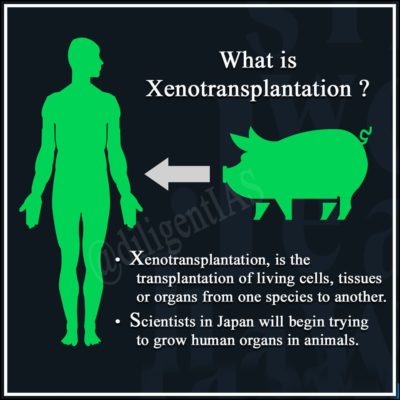For the first time, Japan approves growing human organs in animals 05/08/2019 – Posted in: Daily News
XENOTRANSPLANTATION
For: Mains
Topics covered: About Xenotransplantation, possible benefits and threats, induced pluripotent stem cells (iPSCs)
News Flash
Scientists in Japan will begin trying to grow human organs in animals after receiving government permission for the first study of its kind in the country.
Highlights
- The research involves implanting modified animal embryos with human “induced pluripotent stem” (iPS) cells that can be coaxed into forming the building blocks of any part of the body.
- The research involves generating animal embryos — mice, rats or pigs — that lack a particular organ such as a pancreas.
- The modified embryos are then implanted with human iPS cells that can grow into the missing pancreas. The embryos would be transplanted into wombs where they could theoretically be carried to term with a functioning human pancreas.
induced pluripotent stem/ cells (iPS/C)
|
Background
Japan had previously required researchers to terminate animal embryos implanted with human cells after 14 days and prevented the embryos from being placed into animal wombs to develop.
Hopes and Risks
Xenogeneic transplantation carries risks, in particular of transmission of known or as yet unrecognized xenogeneic infectious agents from animals to human beings and from recipients of xenogeneic transplants to their contacts and the public at large.
Xenotransplantation
Xenotransplantation is any procedure that involves the transplantation, implantation or infusion into a human recipient of either
(a) live cells, tissues, or organs from a nonhuman animal source
(b) human body fluids, cells, tissues or organs that have had ex vivo contact with live nonhuman animal cells, tissues or organs.
Source: The Hindu
Also, read more daily News
- Indus valley script
- Pashmina Testing Centre
- The Intermediate-Range Nuclear Forces Treaty (INF)
- External Commercial Borrowing
- TESS discovers three new planets – TOI 270 planetary System
You are on the Best Online IAS preparation platform. You are learning under experts.
We are present on Facebook- Diligent IAS, LinkedIn- Diligent IAS, YouTube- Diligent IAS, Instagram- Diligent IAS. Get in touch with us.

